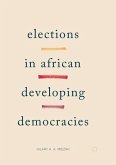This book explores the impact and efficiency of Western intervention in African civil wars. Emphasizing the relational conditions to the study of interventions, it posits the importance of historical, institutional relationships not just in the decision to intervene but also in the process of intervention and its outcome. Drawing from case studies of American and European intervention in Sierra Leone, Côte d'Ivoire, and Mali, the author applies a multi-method research design to identify the role colonial legacy plays in shaping the success of interventions. Her analysis concludes that the relational context of interventions helps determine the likelihood of success and that not all states are appropriately equipped to intervene in all civil wars, which is not simply a function of defense spending on materials. This book thus speaks to both academics and policy-makers specializing in conflict resolution and conflict dynamics in modern African civil wars.
Bitte wählen Sie Ihr Anliegen aus.
Rechnungen
Retourenschein anfordern
Bestellstatus
Storno








